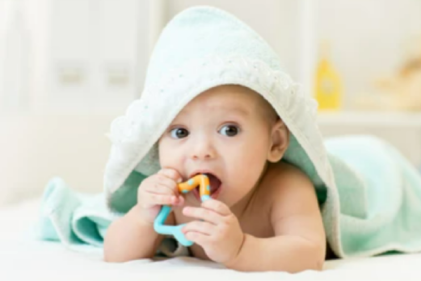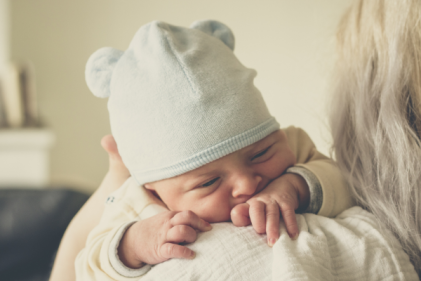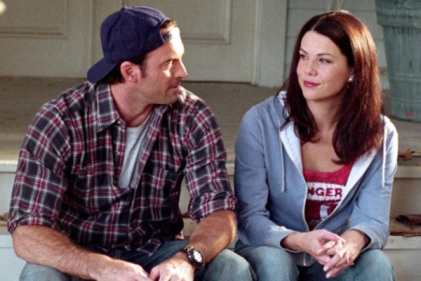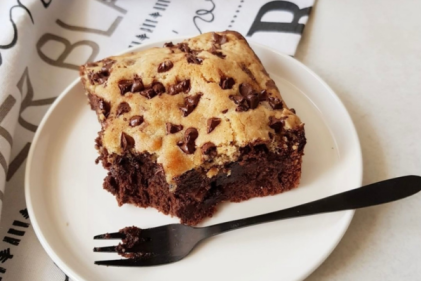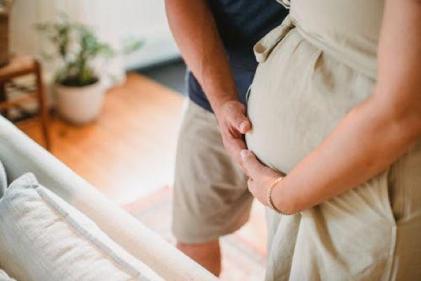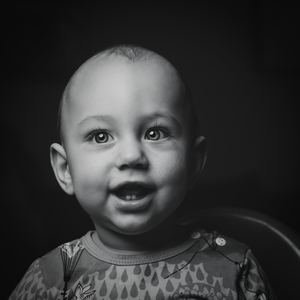 Dr. Abigail Moore answers some common questions that mums ask about teething.
Dr. Abigail Moore answers some common questions that mums ask about teething.
When does a baby generally start teething or does it vary?
Normally the 1st tooth will erupt into the mouth at 6-9 months, however there is a considerable range. Some children are even born with teeth or develop them very early and some children don’t get a tooth until older than 12 months then develop a full set of healthy teeth very quickly! The sequence that teeth come in is more relevant than the age in which they appear.
Are there any telltale teething symptoms that babies get? (I read that teething does not give babies a high temperature)
In the past teething was blamed for a lot of childhood complaints such as high temperatures, coughs, runny nappies and sleep disturbances. There is little evidence to support this. The most common symptoms of teething are excess drooling, hands and fingers in the mouth, daytime restlessness (generally bad form), flushed cheeks and on occasion some loss of appetite. It is important that if a child has a fever or cough they have it checked out by a GP and it is not dismissed as a teething problem.
What are the signs in the mouth that parents should watch out for?
The teeth are often visible as whiter, hard lumpy areas underneath the gums long before they actually erupt. Just before the tooth pokes through the gum about two thirds of children will have some redness or tenderness in the gum over the tooth. Small gaps may be seen in the gum just before tooth appears. Infrequently a blue-purple bruise can appear on the gum a few weeks before a back tooth erupts which is know as an eruption cyst and rarely requires treatment. Often parents will suddenly notice a little white corner of tooth peeking through with no prior warning!
In what order will the teeth erupt in?
Usually the bottom teeth come in before the corresponding teeth on the top. A typical sequence would be the middle 2 front teeth 2 (incisors), then 2 more incisors to each side of the middle ones, giving 4 bottom & 4 top teeth. Next are the 1st back teeth (molars), 1 in each corner of the mouth, then the eye teeth (canines) and finally 2nd molars at the very back. A total of 10 top & 10 bottom teeth are usually present by 2-3 years of age.
How long do baby teeth last for and why are they so important?
Children begin losing the front primary teeth at age 6-7 years in a flurry of tooth fairy excitement! The back teeth are not lost until 10-12 years old, meaning that we must keep these teeth clean & healthy until then. If the back teeth are lost too early due to decay, it may allow shifting of the neighbouring teeth into the gap and cause crowding. This crowding may make a child more likely to need orthodontic treatment. If the primary teeth do develop dental decay children can suffer considerable pain & discomfort so keeping the primary teeth healthy is essential.
Why should mums avoid on-demand breast-feeding at night once the teeth come in? Is there anything else parents should watch out for?
Breast milk is fantastic for your baby but does contain 7% lactose sugar. If this is left to pool on teeth during the night it has been shown to contribute towards decay. It is therfore advisable to limit the frequency of night feeds once teeth have erupted. It is also important never to dip soothers in sweetened substances.
How do you look after baby teeth in terms of brushing them?
As soon as teeth come through they should be kept clean as plaque will build up on them. Some parents wipe the teeth with a clean flannel or muslin. There are also finger brushes which are fun and easy to use, or a very soft baby toothbrush. Children often enjoy chewing the toothbrush as it can relieve those tender teething gums. There is no need to use toothpaste before 2 years of age unless advised by your dentist, but a small smear just to get used to the taste of mint is fine.
Can baby teeth get dental decay?
Unfortunately yes. We see children as young as 1 year old whose teeth are already rotting. Most commonly this is seen due to frequent juice drinking, dipping soothers in syrups or frequent sugary food consumption. As primary teeth are formed during pregnancy, it is possible for pregnancy illnesses or premature birth to affect the strength of the teeth. If the outer layer (enamel) is not formed correctly a child may have ‘softer’ teeth which may be more prone to cavities early on and need to be identified early to avoid problems.
What can parents give their baby to help ease their discomfort while they are teething – i.e. giving them something to chew on?
When children are teething they will attempt to gnaw on everything! This is instinctive as biting helps breakdown the gum overlying the tooth and helps relieves the tenderness. There is a baffling selection of teething toys on the market but any object that is easy to hold, has no sharp edges, is easily cleaned and a pliable texture e.g. rubber or silicone is good for baby. If a toy is brightly coloured or squeaks. some bonus distraction may be provided. Chilled toys can be beneficial or even frozen banana slices for older babies. Lots of people swear by damp knotted face cloths put in the freezer. It is best to avoid putting your own fingers in babies mouths. Parents could use a teething toy to gently massage the area where teeth are coming in. A drink of cooled water may provide relied as well as replace fluids if drooling has been excessive. There are also homeopathic remedies available, e.g. chamomilla granules which can be rubbed on the gums.
Is it best to stay away from syrups such as Calpol?
If babies are very uncomfortable & distressed due to erupting teeth and suffering from tenderness of the gums, it can be useful to give oral liquid paracetemol (e.g. Calpol) in the recommended dose. It is important only to give this when absolutely necessary. If a child is not getting relief from this, is requiring multiple doses, or has a high temperature, it would be best to seek advice from a GP as there may be another cause of the pain. Always be sure to use a sugar-free medication where possible.




